Posts Tagged ‘Burma Partnership’ (399 found)
Two New Briefers: The State of Burma’s Peace Process and Shrinking Space for Civil Society in Burma
Burma Partnership has produced two new briefing papers in connection with Burma-related advocacy at the current 69th session of the UN General Assembly […]
• • •The Myanmar National Human Rights Commission Continues Failing to Deliver
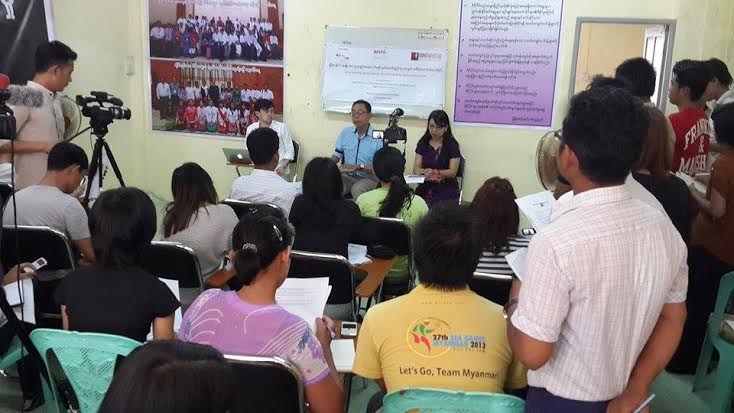 A report authored by Burma Partnership and Equality Myanmar was launched on 25 September 2014 in Rangoon revealing the continuing ineffectiveness of the Myanmar National Human Rights Commission (MNHRC) as well as the lack of independence from the government. The report was launched on the same day that a reshuffle of the members of MNHRC was announced by the government, which came as a complete surprise to civil society organizations due to the lack of consultation.
A report authored by Burma Partnership and Equality Myanmar was launched on 25 September 2014 in Rangoon revealing the continuing ineffectiveness of the Myanmar National Human Rights Commission (MNHRC) as well as the lack of independence from the government. The report was launched on the same day that a reshuffle of the members of MNHRC was announced by the government, which came as a complete surprise to civil society organizations due to the lack of consultation.
Released at the Myanmar Journalists Network in Rangoon, Burma: All the President’s Men, contributed to the annual Asian NGO Network on National Human Rights Institutions (ANNI) Report on the Performance and Establishment of National Human Rights Institutions in Asia (2014). The report analyzes the Myanmar National Human Rights Commission Law 2014 enacted in March this year (enabling law) that institutionalizes the mandate of the MNHRC. The report finds that the law does not guarantee independence from the government and in particular, the president’s office. In contravention of international standards on national human rights institutions, namely the Paris Principles, the selection process does not adequately consult with civil society. As the report points out, “It is up to the selection board to come up with procedures for short-listing candidates, yet the enabling law itself should set out the process/procedure for selection, with consultations with civil society.” The members of the MNHRC are actually chosen by a selection board of ten, five of which are from the government or are government-affiliated. The enabling law states that two members of this board are to come from civil society organizations and a further two are to be MP, yet there is no transparency regarding the procedures under which the two MPs are chosen. Additionally, the chosen civil society members to the selection board are restricted to registered civil society only, thus excluding many outspoken and critical political and human rights groups who feel they cannot register under the current climate […]
• • •New Report Exposes the Continued Ineffectiveness of the Myanmar National Human Rights Commission
Today, the 2014 report on the performance of the Myanmar National Human Rights Commission (MNHRC), All the President’s Men, was released at the Myanmar Journalists Network in Rangoon. Co-authored by Burma Partnership and Equality Myanmar, the report, which contributed to the annual report […]
• • •သမၼတ၏ ဘက္ေတာ္သားမ်ားသာ ျဖစ္ၾကသည္ (All the President’s Men)
In the last year, the Myanmar National Human Rights Commission enabling law was passed, finally institutionalizing its mandate that will begin in 2015. The human rights situation in Burma certainly needs any instrument possible, with continuing abuses by the Burma Army, violations […]
• • •Invitation: Briefing for the Launch of 2014 Report on the Performance of Myanmar National Human Rights Commission
Invitation: Briefing for the Launch of 2014 Report on the Performance of Myanmar National Human Rights Commission 24 September 2014 Dear Friends and Leaders, You are cordially invited to a meeting for a briefing on the performance of the Myanmar National Human Rights Commission (MNHRC) 2014 report, co-authored by Burma Partnership and Equality Myanmar. The […]
• • •Media Advisory: Press Briefing – Launch of 2014 Report on the Performance of Myanmar National Human Rights Commission
Press Briefing: Launch of 2014 Report on the Performance of Myanmar National Human Rights Commission
The 2014 report on the performance of Myanmar National Human Rights Commission (MNHRC), co-authored by Burma Partnership and Equality Myanmar, will be launched at Myanmar Journalist Network office on Thursday, 25 September 2014. The reported contributed to and was published in the 2014 ANNI Report on Performance and Establishment of National Human Rights Institutions in Asia which was recently released in Taiwan and covers the developments that took place over the course of 2013 and significant events in the first quarter of 2014 […]
• • •Karen Civil Society Rallies Around Japan’s Harmful Plans for Eastern Burma
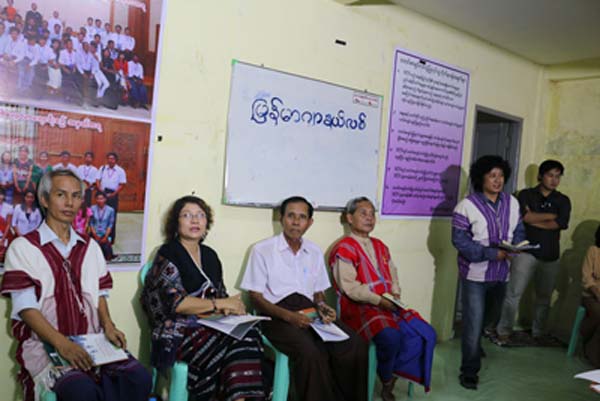 Japan’s lofty development plans for eastern Burma were very publicly rejected by the Karen Peace Support Network (KPSN) at a press conference in Rangoon, citing lack of consultation with communities and the potential for such plans to fuel conflict. Based on a blueprint for extensive development projects produced by the Japanese International Cooperation Agency (JICA), the overseas development arm of the Japanese government, 28 Karen civil society organizations that form the KPSN, released a report to outline their concerns and recommendations. JICA’s blueprint, in which its main goal is to support the return of refugees and internally displaced persons (IDPs), contains four main components; economic corridors, free trade zones and industrial estates, industrial clusters, and urban development. The Japanese government has been working closely with both the Union level and State level Burmese Government in the development of this plan.
Japan’s lofty development plans for eastern Burma were very publicly rejected by the Karen Peace Support Network (KPSN) at a press conference in Rangoon, citing lack of consultation with communities and the potential for such plans to fuel conflict. Based on a blueprint for extensive development projects produced by the Japanese International Cooperation Agency (JICA), the overseas development arm of the Japanese government, 28 Karen civil society organizations that form the KPSN, released a report to outline their concerns and recommendations. JICA’s blueprint, in which its main goal is to support the return of refugees and internally displaced persons (IDPs), contains four main components; economic corridors, free trade zones and industrial estates, industrial clusters, and urban development. The Japanese government has been working closely with both the Union level and State level Burmese Government in the development of this plan.
For Karen civil society, however, there are many concerns, as outlined in the report released on 9 September. Although the blueprint aims to “promote peace through development,” JICA has not conducted a conflict analysis on what is an extremely complicated and fragile context. In fact the plans could serve to exacerbate conflict by facilitating land confiscation, one of the loci of tension in the ceasefire process. Also, improving transport and road access to areas traditionally held by ethnic armed groups such as the Karen National Union (KNU), allows easy access for Burma Army soldiers to the heart of Karen areas. We must not forget the abusive nature of the Burma Army that has been terrorizing civilians for decades and continues to do so, despite a ceasefire in place. Will exposing more communities, who are already vulnerable to abuses, to the unreformed Burma Army really aid peace […]
• • •Unity Must Prevail
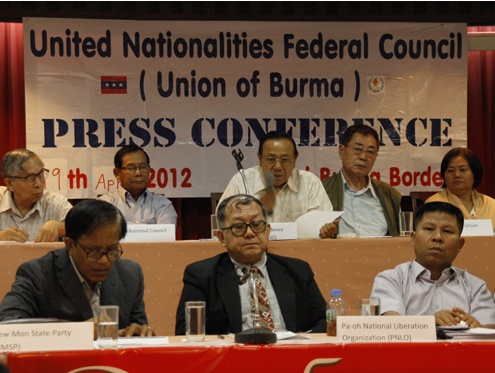 After its organizational conference held on a Thailand-Burma border area, disagreements between the United Nationalities Federal Council (UNFC) and the Karen National Union (KNU) has led to the KNU suspending its’ membership of the UNFC, a setback for the peace process. While this strikes a blow into the government engineered narrative that the peace process is making substantial progress, it is particularly worrying for the ethnic communities that have been suffering from this conflict for decades.
After its organizational conference held on a Thailand-Burma border area, disagreements between the United Nationalities Federal Council (UNFC) and the Karen National Union (KNU) has led to the KNU suspending its’ membership of the UNFC, a setback for the peace process. While this strikes a blow into the government engineered narrative that the peace process is making substantial progress, it is particularly worrying for the ethnic communities that have been suffering from this conflict for decades.
Ostensibly, disagreements over organizational structure have caused this rift, although there are also disagreements within the KNU leadership itself over its position in the UNFC, leading to fears of a split within what has traditionally been the most prominent ethnic armed group. Previous Burma regimes have used divide and rule tactics to weaken armed resistance and to sabotage ethnic unity and it is imperative that this does not happen now. As ethnic leaders squabble over leadership structures, surely much to the delight of the leaders of the Burma Army, it is the most vulnerable populations who feel the pressures, while the government manages to convince elements of the international community that a peace settlement is just around the corner. It is crucial that whatever reason for the KNU’s withdrawal from the UNFC, they must put the ethnic communities at the forefront of their decision making […]
• • •Draconian Sentences of Unity Weekly Journalists Must at the Very Least be Drastically Reduced
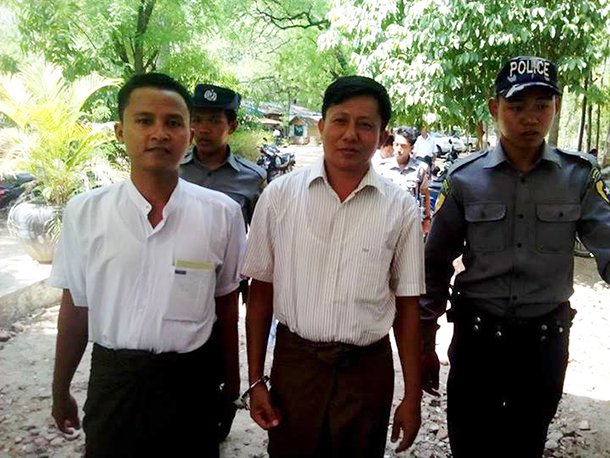 On Thursday 28 August, lawyer Robert San Aung submitted to Magwe regional court the final appeal against the harsh verdicts brought against the five Unity Weekly journalists on10 July. They were sentenced to ten years’ imprisonment with hard labor following the publication of a report in January of this year that gave details of an alleged chemical weapons facility in central Burma. They were charged for trespass and for “disclosing state secrets” in violation of the 1923 Official Secrets Act (OSA). Robert San Aung submitted the appeal on the grounds that the four reporters are innocent and should therefore be released from prison, and that the sentence of the journal’s executive be reduced by half. The Magwe regional court is expected to issue a decision within a month.
On Thursday 28 August, lawyer Robert San Aung submitted to Magwe regional court the final appeal against the harsh verdicts brought against the five Unity Weekly journalists on10 July. They were sentenced to ten years’ imprisonment with hard labor following the publication of a report in January of this year that gave details of an alleged chemical weapons facility in central Burma. They were charged for trespass and for “disclosing state secrets” in violation of the 1923 Official Secrets Act (OSA). Robert San Aung submitted the appeal on the grounds that the four reporters are innocent and should therefore be released from prison, and that the sentence of the journal’s executive be reduced by half. The Magwe regional court is expected to issue a decision within a month.
While the offense under Section 3(1)(a) of the OSA is a strict liability offense – meaning that the prosecution only has to prove that the defendants were in the vicinity of the prohibited place for them to be found guilty – in order for the other convictions to stand, the burden is on the prosecution to show that the secrets alleged to have been leaked were intended to or were likely to have breached state security or assisted an enemy. The journalists must be shown to have leaked detailed and useful information, to have done more than just report that the facility was a weapons factory. It is not clear that the prosecution ever satisfied this requirement.
Even so, if the appeal submission fails to convince the court either that the journalists are not guilty of any substantive offenses, or that there are specific and legitimate defenses under the OSA that can be relied upon, then at the very least the appeal should be successful on grounds of mitigation regarding the alleged offenses, meaning that the sentences should at a minimum be drastically reduced […]
• • •Elusive Nationwide Ceasefire Agreement Continues to Distract from Substantial Peace Talks
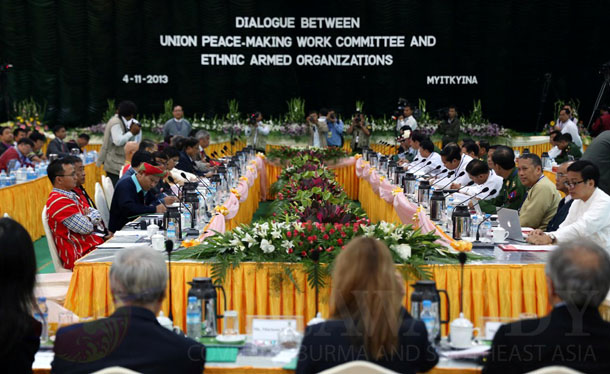 As talks over the signing of a nationwide ceasefire agreement (NCA) are delayed once again, thus pushing substantive dialogue further into the future, Burma’s decades long civil war rages on in Kachin and Shan States.
As talks over the signing of a nationwide ceasefire agreement (NCA) are delayed once again, thus pushing substantive dialogue further into the future, Burma’s decades long civil war rages on in Kachin and Shan States.
Talks over the signing of the NCA have now gone on for nearly 18 months and the situation on the ground has still not changed. The Burma Army continues to attack ethnic armed groups in areas where ceasefires have been signed, such as those of the Shan State Army South and Shan State Army North, as well as continuing offensives against the Kachin Independence Army and the Ta’ang National Liberation Front (TNLA) where there is no ceasefire. On Monday 18 August, a civilian in Namkan Township, Shan State was shot dead and another hospitalized after a clash between the TNLA and Burma Army. Human rights violations such as sexual violence, arbitrary arrest, torture and extrajudicial killing continue in these active conflict areas, while in areas where individual ceasefires are holding, the Burma Army is entrenching its power both militarily and economically through land confiscation and reinforcement of its positions.
The aim in this pursuit of the NCA is questionable as it distracts from the real issues at hand that prevent the ethnic people of Burma from enjoying genuine peace. Let us not forget that the Burma government has already signed ceasefire agreements with most ethnic armed groups. But has this stopped the attacks and human rights violations inflicted on local communities by armed forces? This question cannot be answered in the affirmative. Just ask the villagers who live in Murng Hsu, Shan State, whose homes came under artillery attack, and were forced to act as guides for the Burma Army in June of this year in a supposed ceasefire area. If all groups sign on to the NCA, the biggest question is how can they trust that the Burma Army will actually cease its attacks. There is scant evidence of this from current and previous ceasefires […]
• • •








 All posts
All posts